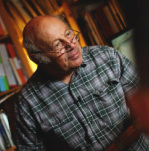|
I have for some years been boasting that I am Scotland's greatest cow poet, but I have been demoted by a better one - Jim Carruth, who was made Glasgow's poet laureate or makar in 2014. Jim comes from a Renfrewshire farm and his poems about farming life and life in general are really beautiful. However, we are both on a par in James Naughtie's selection of "The Best of The Best" poems for the Scottish Poetry Library as Jim and I are two of the twenty selected from fifteen years of "The Best" of each year. My poem is about cows and his is about a mole-catcher. You can read them on the Scottish Poetry Library website, along with various comments from the earlier editors of "The Best" and from James Naughtie and the poets themselves.
I interviewed Jim Naughtie a while back for a radio programme. Yes, I know, he is the radio interviewer, but I wanted him to talk about Ronald Center, his piano teacher in Huntly long ago for one of my Scotland's Music programmes. Center was an outstanding composer. Jim was as good an interviewee as interviewer. I look forward to meeting him again when he presents his choice of poems at the Aye Write festival in Glasgow on the 30th March, when some of us will be reading our poems and one other Scottish poem (any period) of our own choice. I think I will go for a Drummond of Hawthornden sonnet. I am working on the third edition of Scotland's Music and have recently been doing a statistical analysis of triadic 4-note patterns in a 1766 fiddle manuscript. Esoteric or what? But it is in fact very interesting because it highlights the extraordinary inventiveness of Scots fiddle music composers working with a deliberately limited harmonic palette. They knew how to make a lot out of a very little. If only Haydn and Mozart had known what the Scots were up to they would have made their viola and cello parts much more interesting, instead of their usual do-dee-da-dee pattern going on endlessly while the violin does its prima-donna thing. I went down to Glasgow by train from Mallaig on Thursday, beautiful, snowy, to hear Stuart MacRae's new opera Anthropocene. It was not an easy listen, but there was one truly beautiful section when the Ice-maiden first realises she is alive. The repeated descending bass line, harp, I think, and the voice beautifully hesitant, perfectly pitched, made for a little spell of wonderful music I will never forget. I had a chance while down to see my son, Sean's photographic exhibition Heids in the Glasgow Royal Concert Hall - part of Celtic Connections. If you don't know about the Festival, look it up. The photos are of some of the previous year's Celtic Connections musicians and they are absolutely brilliant. Intimate, funny, revealing, touching, always totally natural. Nothing posed. Back up on the train the next day; all the snow gone, low mists obscuring everything. So what with the poets, the new opera, and the Celtic Connections photographs, Scotland's cultural scene is vibrant. Long may it continue so. Comments are closed.
|
John PurserJohn Purser is widely known as a composer, musicologist, poet, playwright, and broadcaster. Archives
February 2022
Categories |
copyright © 2014 John Purser


 RSS Feed
RSS Feed